Dinosaurs, Mermaids, and Haunted Lumber: The Best of L. Sprague De Camp
The Best of L. Sprague de Camp
(Science Fiction Book Club edition, 1978. Cover by Richard Corben)
The Best of L. Sprague De Camp (1978) was the fifteenth installment in Lester Del Rey’s Classic Science Fiction Series. Poul Anderson (1926–2001) gives the introduction. Darrel Sweet (1934–2011) does his second cover of the series, the first being The Best of Cordwainer Smith. L. Sprague De Camp (1907–2000), still living at the time, wrote the afterword.
I’m a fairly late-comer to science fiction. I grew up with Star Wars and typical sci-fi shows and movies of the late 70s and 80s, but my reading picks tended to be more towards fantasy and horror. So, like many of these classic sci-fi authors in the Del Rey series, L. Sprague De Camp was a new name to me. And it’s interesting, I think, how one can come to a new writer.
In all honesty, I was not looking forward to reading this volume. Most of what I’ve read of and about De Camp hasn’t given me the most favorable impression. Case in point: A couple of years ago I compared De Camp’s Robert E. Howard (REH) biography with Mark Finn’s. If you know anything about De Camp’s reputation among many REH fans, you’ll know that it is usually less than favorable (again, see my earlier post for more details). And, after reading De Camp’s REH bio, I came around to agreeing with some of this critical press. In short, I thought that De Camp could often come off as conceited with his overly bold claims, especially given his tendency of providing insufficient evidence — or none at all!
But after reading The Best of L. Sprague De Camp, I have to say that despite his reputation with many an REH fan, this has become one of my favorite volumes in the Del Rey series. I found De Camp to be a very fascinating writer. Two things, I think, really stand out in his science fiction writing.
[Click the images for dinosaur-sized versions.]
The Best of L. Sprague de Camp
(Del Rey paperback edition, 1978. Cover by Darrell Sweet)
One, De Camp can be very funny. Many of his stories can be kind of zany setups for slapstick. “Nothing in the Rules” is about a women’s swim meet where one of the coaches enters a mermaid against the other swim teams. Since the judges see “nothing in the rules” against entering a mermaid, they allow it. Given this argument from silence, one of the competing coaches enters a sea lion, and all kinds of other hilarity ensues.
“The Hardwood Pile” is about a haunted pile of lumber. Not scary, but funny. It turns out that the pile of wood was from a tree inhabited by a sphendamniad — a sort of tree fairy — who is more than a little miffed that people keep taking her home and trying to destroy or sell it.
“The Guided Man” is about a service that has a proprietary technology that allows the seemingly inept to have their bodies taken over remotely by experts who easily steer them through awkward or difficult situations. One of the “guides,” named Falck, falls in love with the love interest of one of his customers (Ovid Ross). A pretty hilarious scene evolves when Falck crosses the wires of his guiding machine with another guide who is supposed to be helping a ballet dancer, while Ovid Ross is at a trade show. The result:
Ovid Ross took off in a tremendous leap from the stage and began bounding around the showroom, leaping high into the air to kick his heels together and fling his arms about. Ross, imprisoned in his skull, was as astonished as anyone. He thought Falck must have gone mad. (p. 242).
In the introduction, Poul Anderson takes issue with those who wish to describe De Camp’s stories as “wacky.” Anderson claims they are rather the “meticulously detailed working out of the consequences of a bizarre assumption” (p. xii). Good description, but that also seems like a good definition of “wacky” to me. At any rate, I found many of De Camp’s stories downright funny.
Some of de Camp’s 20th Century paperbacks
De Camp’s humor often comes out in funny one-liners as well. One example, a character named Staples is considering a dangerous animal in a story:
Staples knew that the animal could run circles around him on level ground, and moreover that if he caught him he wouldn’t be satisfied to run circles around him. (p. 75)
Besides his humor though, another thing that really stuck out to me about De Camp was his variety of stories. In fact, I would say that De Camp has a wider variety of stories and styles than any other volume that I’ve read thus far in this Del Rey Classic Science Fiction Series.
This volume not only gives examples of De Camp as a science fiction and fantasy writer, his “Language for Time Travelers” is also an essay on language change over time, a bit of philology. Something worth considering if you’re planning on writing a science fiction story set in the future. I don’t know anything about linguistics but I found De Camp’s essay interesting and plausible. One of my older friends actually met De Camp at a con back in the 70s and found him to be very intelligent and interesting. I think this essay does a good job of showing that.
But The Best of L. Sprague De Camp also displays other variety. “Judgment Day” was a very dark, fictional autobiography of a scientist who has either become part of building atomic weapons or something similar. It’s a depressing introspective tale about an individual with a very gloomy childhood who grows up being bitter and vindictive. De Camp says in the afterword that it is only slightly about himself, but I found myself drawn into the exploration of this dark consciousness.
So L. Sprague De Camp, love him or hate him, I don’t think it can be denied that he was a very gifted writer in the sci-fi and fantasy field, one whose storytelling skills exhibited great humor, variety and also flair. De Camp was not your typical pulp writer — at least not compared to the other authors in this Del Rey series — and this volume has encouraged me more than any other in the series to seek out the author’s work.
Here’s the complete Table of Contents for The Best of L. Sprague De Camp.
L. Sprague De Camp—Engineer and Sorcerer, by Poul Anderson
“Hyperpilosity” (Astounding Science Fiction, April 1938)
“Language for Time Travelers” (Astounding Science Fiction, July 1938)
“The Command” (Astounding Science Fiction, October 1938)
“The Merman” (Astounding Science Fiction, December 1938)
“Employment” (Astounding Science Fiction, May 1939)
“The Gnarly Man” (Unknown, June 1939)
“Nothing in the Rules” (Unknown, July 1939)
“The Hardwood Pile” (Unknown, September 1940)
“The Reluctant Shaman” (Thrilling Wonder Stories, April 1947)
“The Inspector’s Teeth” (Astounding Science Fiction, April 1950)
“The Guided Man” (Startling Stories, October 1952)
“Judgment Day” (Astounding Science Fiction, August 1955)
“A Gun for Dinosaur” (Galaxy Science Fiction, March 1956)
“Reward of Virtue” (The Magazine of Fantasy and Science Fiction, 1970)
“The Emperor’s Fan” (Astounding: John W. Campbell Memorial Anthology, 1973)
“The Ameba” (Yandro, December 1973)
“The Little Green Men” (Fantasy Crossroads #7, February 1976)
“Two Yards of Dragon” (Flashing Swords #3, ed. by Lin Carter, 1978)
Afterword by L. Sprague De Camp
Our previous articles on L. Sprague de Camp include:
L. Sprague de Camp, Fletcher Pratt, Gardner Fox and Appendix N: Advanced Readings in D&D
Vintage Treasures: The Spell of Seven, edited by L. Sprague de Camp
Vintage Treasures: Ring Around the Sun by Clifford D. Simak / Cosmic Manhunt by L. Sprague de Camp
Vintage Treasures: Tales From Gavagan’s Bar by L. Sprague de Camp and Fletcher Pratt
Vintage Treasures: The Compleat Enchanter by L. Sprague de Camp and Fletcher Pratt
The Ballantine Adult Fantasy Series: Land of Unreason by Fletcher Pratt and L. Sprague de Camp by Keith West
The Barbarism of Bullfighting and Archaic Diction in L. Sprague de Camp’s “The Rug and the Bull” by Gabe Dybing
Swords & Sorcery edited by L. Sprague De Camp by Fletcher Vredenburgh
Logical Swords & Sorcery: The Tritonian Ring by L. Sprague de Camp by Fletcher Vredenburgh
Hubert Rogers’ Astounding Covers — And His Fascinating Correspondence with Robert A. Heinlein and L. Sprague de Camp by Doug Ellis
The Great Pulp Gathering: That Time Jack Williamson, L. Sprague de Camp, Frank Belknap Long, Edmond Hamilton, John W. Campbell, Manly Wade Wellman, Otis Adelbert Kline and others met at Mort Weisinger’s House in 1937 by Doug Ellis
Birthday Reviews: L. Sprague de Camp’s “The Figurine” by Steven H Silver
The Reluctant King series
And our previous coverage of the Classics of Science Fiction line includes (in order of publication):
Smugglers, Alien Vampires, and Dark Dimensions: The Best of C. L. Moore by James McGlothlin
Rich Playboys, Mad Scientists, and Venusian Monsters: The Best of Stanley Weinbaum by James McGlothlin
Vampires, Frozen Worlds, and Gambling With the Devil: The Best of Fritz Leiber by James McGlothlin
Space Colonies, Interstellar Fleets, and The Martian in the Attic: The Best of Frederik Pohl by James McGlothlin
A Neglected Master: The Best of Henry Kuttner by James McGlothlin
A Shaper of Myths: The Best of Cordwainer Smith by James McGlothlin
Wings, Wind, and World-Wreckers: The Best of Edmond Hamilton by Ryan Harvey
Shark Ships and Marching Morons: The Best of C. M. Kornbluth by James McGlothlin
Drawing Out What it Truly Means to be Human: The Best of Philip K. Dick by James McGlothlin
Wit and Play in Classic Science Fiction: The Best of Fredric Brown by James McGlothlin
Dead Cities, Space Outlaws, and Planet Gods: The Best of Leigh Brackett by Ryan Harvey
Gods, Robots, and Man: The Best of Lester del Rey by Jason McGregor
From the Pen of a Great Pulpster: The Best of Robert Bloch by James McGlothlin
Germ Warfare, Sentient Planets, and Dark Age Alchemy: The Best of Murray Leinster by James McGlothlin
Davey Jones, Alien Spores, and Riding on a Comet: The Best of Raymond Z. Gallun by James McGlothlin
See all of our recent Vintage Treasures here.
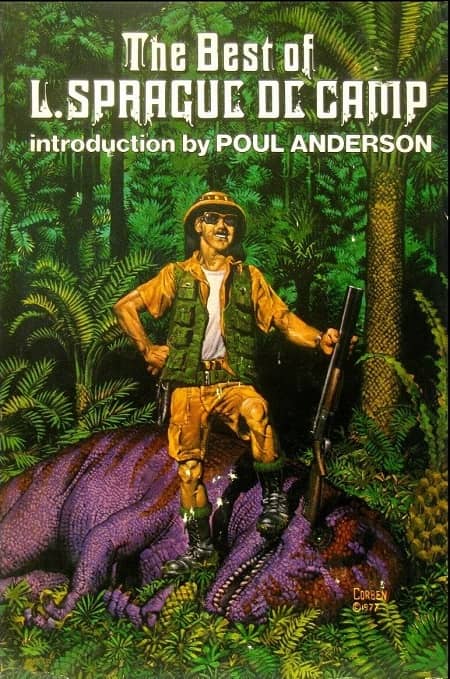
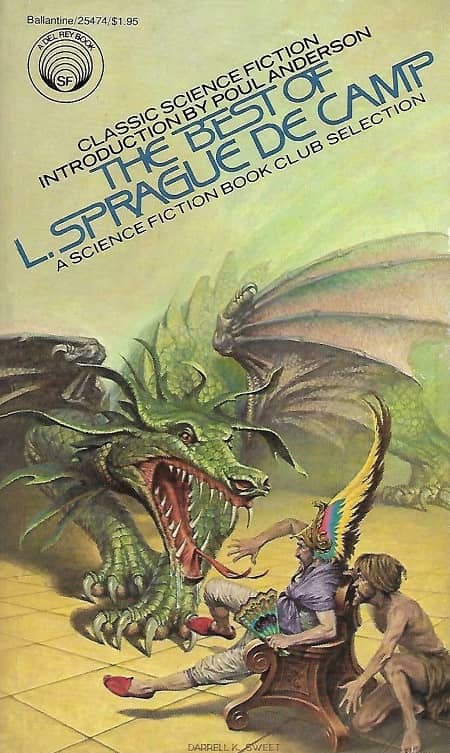
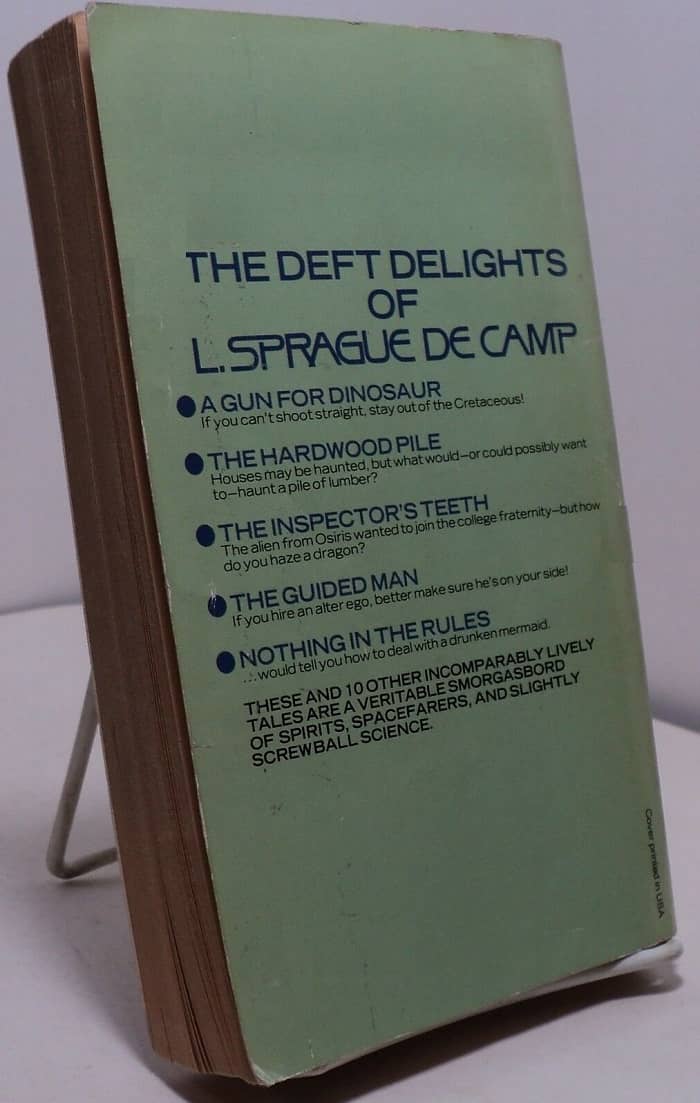
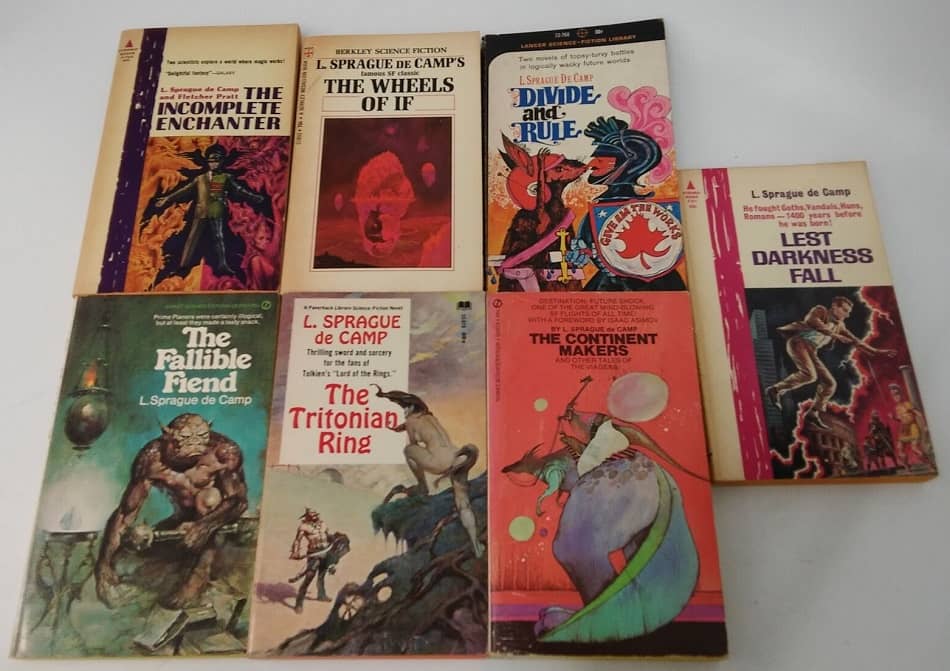
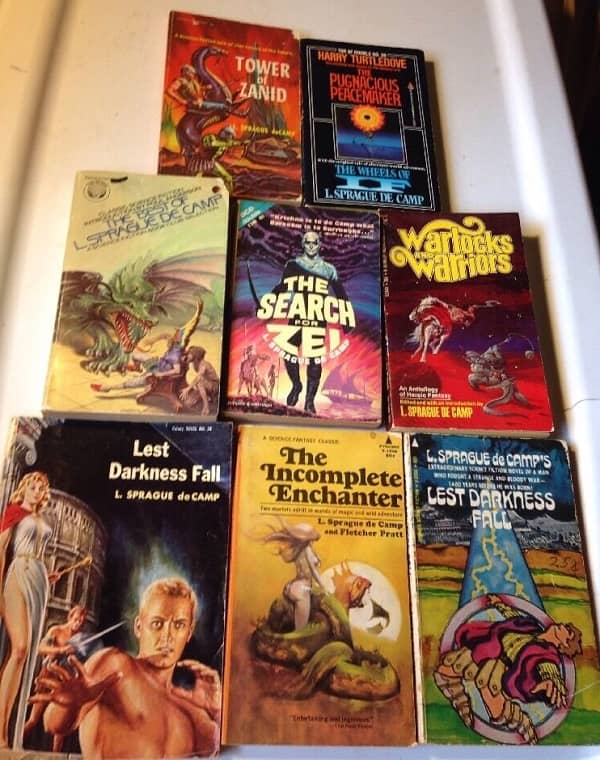
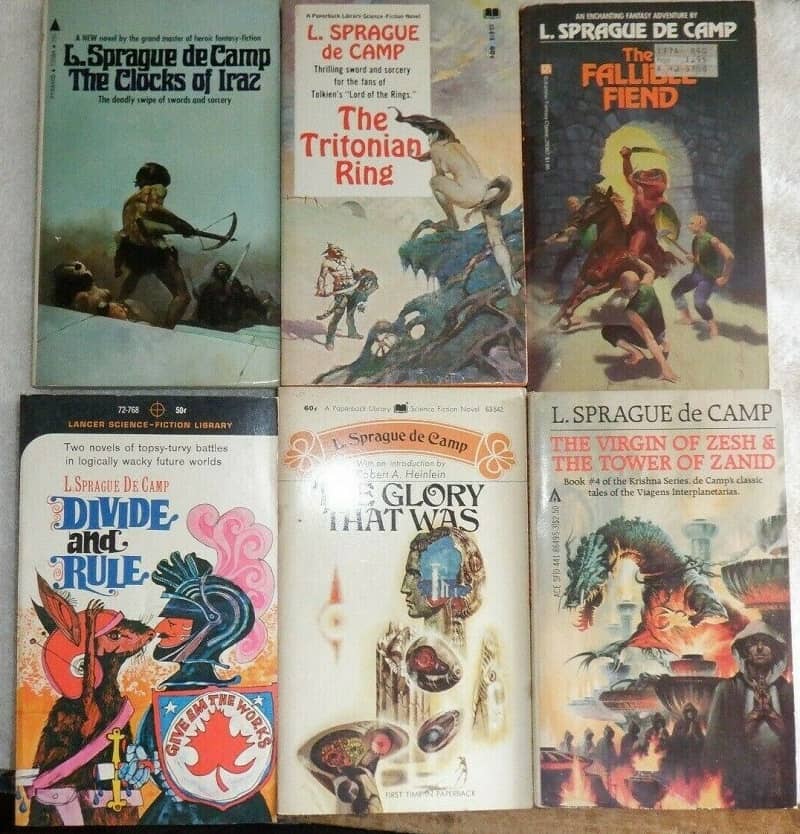
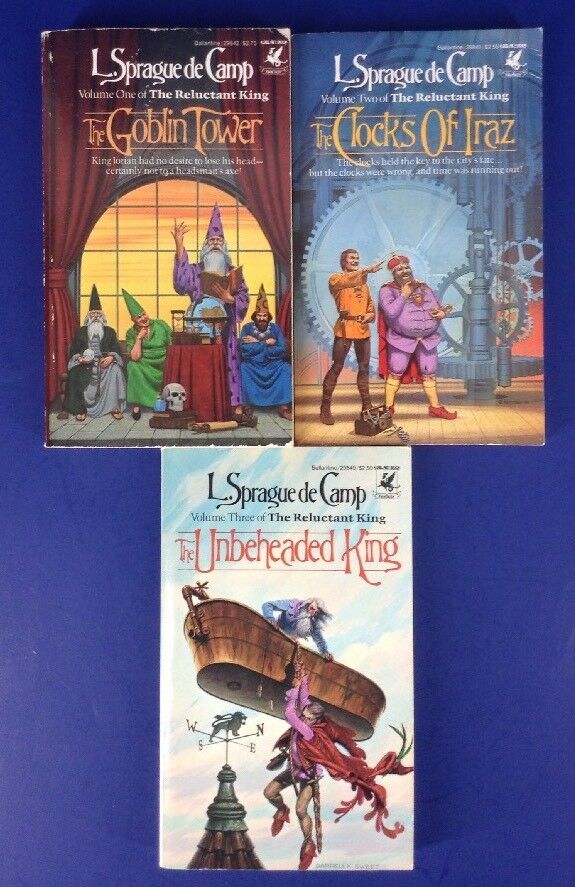
Ah, confirmed old de Camp fan that I am, this is the one I’ve been waiting for!
I only wish a few more of my favorites in this collection had been highlighted, such as “Hyperpilosity” (all of humanity suddenly grows fur!), “The Command” (bear saves world!), “The Gnarly Man” (immortal Neanderthal risks losing everything for science!) and “The Reluctant Shaman” (Iroquois sprites run amuck!). Not to mention the unaging dragon classic “The Emperor’s Fan,” which I will refrain from reducing to a headline. I could go on, but that would leave nothing for other new readers to discover.
Glad you were pleasantly surprised, James. And that you picked up on the wide range of his writing and the non-pulpish feel. You might want to correct the links to previous articles on de Camp, though; at present, they do NOT link to articles on de Camp.
I greatly enjoyed your article.
de Camp is a pretty good example of “never meet your heroes.” I love The Tritonian Ring (he was probably better off playing in his own sword and sorcery sandpit) and Lest Darkness Fall is very, very good (although I didn’t find his attempts at humor funny). His erudition shows in his work to good effect, and he played an invaluable role in promoting Robert E. Howard’s work and ensuring that it would live on.
He was also a huge jerk. He had a bad tendency to play armchair psychologist with fellow SF writers. Invariably after the writers were dead, which is chickens***. Just as we can thank de Camp for REH’s continued relevance, we can also “thank” him (and Damon Knight) for a dim conventional view of REH personally.
His work with Fletcher Pratt is well worth a look; the Harold Shea stories have been favorites of mine for years.
I’ve owned this volume for many a year and love it. Especially “a Gun for Dinosaur”. I’m saddened that people keep trying to adapt (and fuck up) “a Sound of Thunder” when aGFD would likely be much easier (provided you have the budget for the dinosaurs).
@Brian Kunde: I wish I had more available word count to address more of the stories. But they were all good! There wasn’t really a “stinker” here, which is rare in any anthology.
@everydayshouldbetuesday: Thumbs up!
@John E. Boyle: I’ve heard that. I’m definitely intrigued given this collection.
@LurkerWithout: Funny you mention that. I was actually thinking about the Bradbury story when reading “A Gun for a Dinosaur”. My guess is that Bradbury is just more well-known than deCamp. It’s like all of these crappy movies based upon every little scrap Stephen King has ever written, even though there’s tons of other great horror material out there. Well-known names are just typical draws for movies, regardless of quality of content or how easy/hard to adapt to screen.
Some of the reason the Bradbury story may attract more attention than the de Camp might also be because the de Camp story was actually a response to it, as he himself remarked on a number of occasions. He didn’t find Bradbury’s take on big game hunting in the Mesozoic convincing, so he provided his own take on how it would likely be. And, incidentally, put in an argument for changes to the timestream in the deep past being self-correcting rather than butterflying into a drastically changed present.
I note that the links to previous articles on de Camp still … aren’t to previous articles on de Camp.
While I tend to share the general opinion of de Camp in regards to REH (both the good and the bad), I’ve long enjoyed de Camp’s short fiction. This was one of the first books in this series I read, and I recall liking all the stories. I think he was better at shorter lengths; I’ve gotten the impression from his novels, including some of his collaborations with Pratt, that he got bored and only kept writing to hit a word count. You’re right, though, about his range and variety of styles. He’s definitely worth reading, at least at short lengths.
> You might want to correct the links to previous articles on de Camp, though; at present,
> they do NOT link to articles on de Camp.
Brian,
Quite right. That was my mistake, not James’s. I have corrected it, and that section now includes active links to a baker’s dozen previous articles on de Camp by Keith West, Gabe Dybing, Fletcher Vredenburgh, Doug Ellis, Steven H Silver, and others. Thanks for pointing it out!
Coming in late, here, but enthusiastically.
For me, de Camp has a wider range than any other Golden Age author. Sometimes reading his stuff feels like I’m rubbing sand into my eyes. Sometimes it’s like tobogganing downhill after an ice-storm: super-easy, fast, and exhilarating. But the BEST OF really does gather a lot of his best stuff, and this is a great, thoughtful review.
For a while it looked like NESFA was going to do a “compleat de Camp”, at least as far as sf/f goes. That project seems to have sputtered out, but the first two volumes (YEARS IN THE MAKING and THE MATHEMATICS OF MAGIC) are available, and contain a lot of his best work.
People who love REH tend to hate de Camp, and I can kind of see it on the biography side. De Camp simply didn’t have the sympathy to see someone like REH clearly.
Re Conan and REH’s sword-and-sorcery in general: there probably wouldn’t have been a revival of interest in this stuff without people like de Camp, Carter, Leiber et al. beating the drum through the 50s and 60s.
I’ve always found de Camp to be an interesting SF/F figure and have always been a little off put by the de Camp hater camp.
To be sure, de Camp’s Conan pastiche’s are not as strong as Howard’s originals. This is true of almost every writer who’s attempted to pastiche the character, you usually get more caricature than character. Equally, de Camp’s mid-Century psychological examination of Howard is simplistic and Freudian. So was the majority of psychological criticism of the time and so too is a good deal of modern literary criticism by graduate students.
I’m not trying to pick fights with people, but I’m of the cohort who would not have read Conan were it not for de Camp. The Glenn Lord editions of Conan weren’t available to me when I was reading the character. My library only had the Lancer/Ace paperbacks. I read them voraciously. Sure, I noticed some of the works seemed out of place, but I loved them and I would never have read them unless de Camp and Carter had been out there promoting them…even with the film.
Since then, I’ve come to read de Camp’s own fiction and found a rich and varied catalog of tales.
I love REH and I love de Camp. They are different in style and mentality. One is the English professor in tweed and smoking his pipe. The other is the rough and tumble old school penny-a-word writer. They have different experiences and world views from each other, but I’ve shared a bit of each of their experiences and am grateful that both wrote to entertain others.
The first de Camp book everyone should read is LEST DARKNESS FALL, which is quite brilliant and compulsively readable. It is the sort of thing you might try to finish in one sitting. I am also particularly fond of “The Gnarly Man,” which is a charming and warm (but not actually funny) sort about an immortal Neanderthal living in the present. A typically practical de Campian touch: The Gnarly man has to disappear again, but asks the narrator to recover his hat, because finding a hat for a Neanderthal head size is difficult.
Every writer of alternate history should read “Aristotle and the Gun,” in which history is changed, not by a battle turning out differently, but by an idea turning out differently.
I’m glad to be seeing all of this love for De Camp’s works. Too bad about the REH connotations.